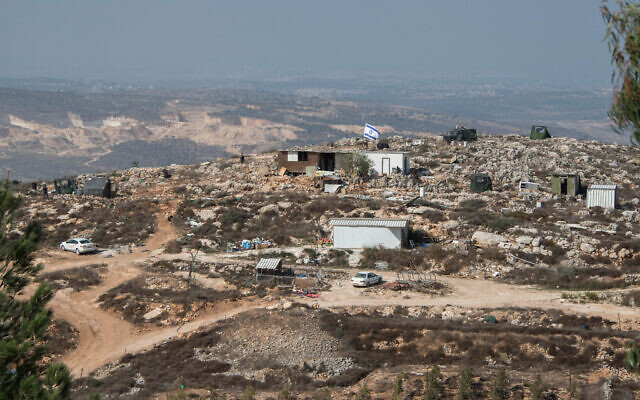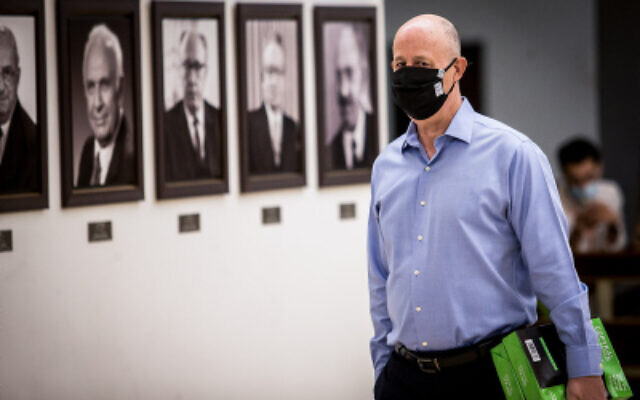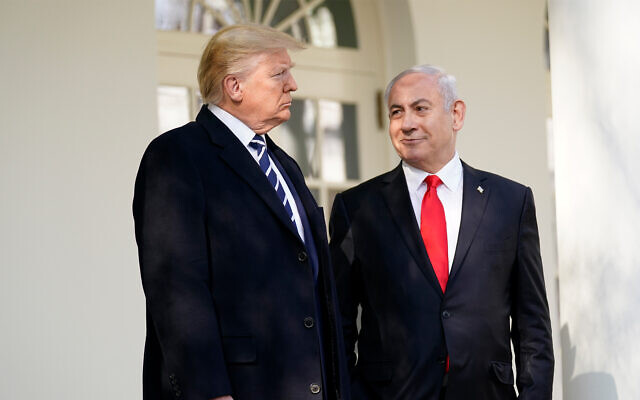Tzachi Hanegbi claims PM backs move to regulate illegal communities, many built on Palestinian land, but Blue and White minister says move will require AG backing

The government will advance a proposal to legalize dozens of wildcat outposts in the West Bank, many of which are built on private Palestinian land, Settlement Affairs Minister Tzachi Hanegbi announced Wednesday.
Responding to a query on the matter in the Knesset plenum, Hanegbi said that he received the prime minister’s approval to discuss the matter with Minister of Civil and Social Affairs in the Defense Ministry Michael Biton from the Blue and White party.
“I’m pleased to announce for the first time that we agreed that together we will formulate a draft resolution for the government to promote all legal moves at our disposal in order to [legalize West Bank outposts],” Hanegbi said.
“I’m convinced that the government will weigh the issue seriously. After 20 long years during which the brave pioneers acted on behalf of us all, the time has come for us to act on their behalf as well,” he said of Israeli settlers, who built their West Bank homes illegally without the necessary permits. All outposts classified as illegal today were founded in the last 20-30 years.
However, Biton told Walla news that Hanegbi did not clear the announcement with him and that he will only back such a move if it has the attorney general’s approval — a broadly worded resolution is unlikely to gain the backing of legal higher-ups.

The announcement follows weeks of pressure from settler leaders and far-right lawmakers who have pushed for the legalization of the wildcat hilltop communities in the final weeks while US President Donald Trump is still in office. The Trump administration has avoided criticizing settlement expansion and has taken several steps to provide a stamp of its own approval to Israeli presence beyond the Green Line.
This has included repudiating a State Department legal opinion that deemed settlements to be illegal, signing an agreement last month expanding scientific cooperation to include academic institutions in the settlements, and a State Department directive announced last week by Secretary of State Mike Pompeo while visiting a settlement winery that all US exports originating from Israeli-controlled territories in the West Bank be marked as “made in Israel.”
Hanegbi stated that the proposal would be advanced while Trump is still in office, but Biton told Walla news that would not be the case. “This process will unfortunately take several years,” he said, appearing to take the air out of the proposal.
While the international community considers all settlement activity illegal, Israel differentiates between legal settlement homes built and permitted by the Defense Ministry on land owned by the state, and illegal outposts built without necessary permits, often on private Palestinian land.
Some 120 outposts exist throughout the West Bank. Roughly a dozen of them look like established towns with hundreds of families. About 60 outposts are small agricultural communes that often only house a handful of families with little infrastructure. A similar number of outposts are tiny “settlement points” often consisting of a makeshift structure or two where ultra-nationalist teens known as hilltop youth live.
Just about all are established by national religious settlers bent on expanding Israeli presence in the West Bank while preventing Palestinian territorial contiguity.

Hanegbi did not specify whether all of these various forms of outposts will be legalized as a result of the move, which will likely face legal challenges in the High Court of Justice, given the illicit nature in which these communities were established.
Blue and White chairman Benny Gantz had indicated during election campaigns that isolated settlements would have to be evacuated in a future peace agreement with the Palestinians. But since entering Netanyahu’s government, he has taken meetings with settler leaders and his office last month okayed approvals for roughly 5,000 Israeli homes all throughout the West Bank. Blue and White also backed the High Court of Justice’s decision to reconsider its decision to order the demolition of the Mitzpeh Kramim outpost.
The fact that Biton is involved in the forming of the outpost legalization proposal indicates that the centrist party that gained considerable support from center-left Israelis during the election will likely support the move that would mark the latest blow to hemorrhaging prospects for a two-state solution.
Responding to Hanegbi’s announcement Yamina leader Naftali Bennett said this would be a “historic” achievement, but stressed that “the only test will be in the implementation.”
Yamina No. 2 Bezalel Smotrich said he too hopes that this will not “a meaningless declaration.” He adds: “Twenty thousand [outpost] residents are not second-class citizens and deserve to have equal rights.”

The Yesha umbrella council of settler mayors said the announcement was “exciting news for anyone for whom the issue of Israeli settlement in Judea, Samaria and the Jordan Valley is close to his heart.”
“For many years, hundreds of families living in [outposts] have not been able to enjoy the most basic things — running water, regular electricity, internet and a proper security apparatus,” the group said, adding that it was looking forward to working with Biton, Hanegbi and Netanyahu to advance the proposal.
Tamar Zandberg from the left-wing Meretz party blasted the move. “The Likud intends to arrange a license for the theft of land in the wild West [Bank], and how unsurprising that it is being done with Blue and White, which wouldn’t recognize the values of its voters if they hit them in the face.
“Instead of taking advantage of the momentum spurred by our new relations with Arab countries to further normalize relations with our neighbors, the government chooses to suck up to the settlers for the sake of a political battle with Bennett all while fatally injuring the State of Israel.”
As reported by The Times of Israel
